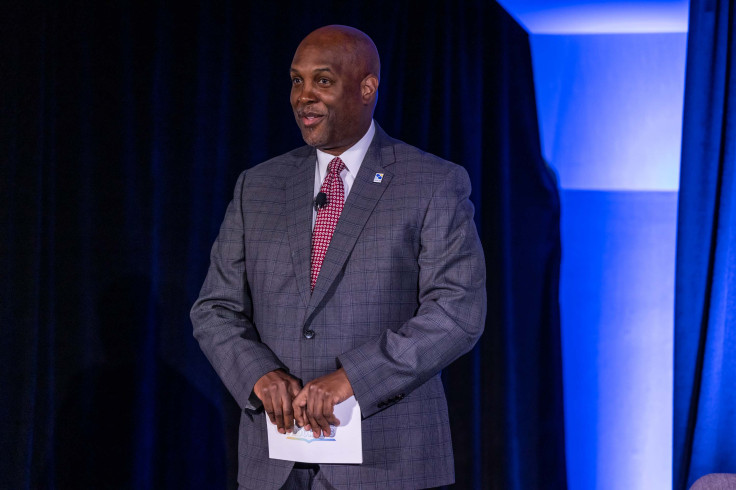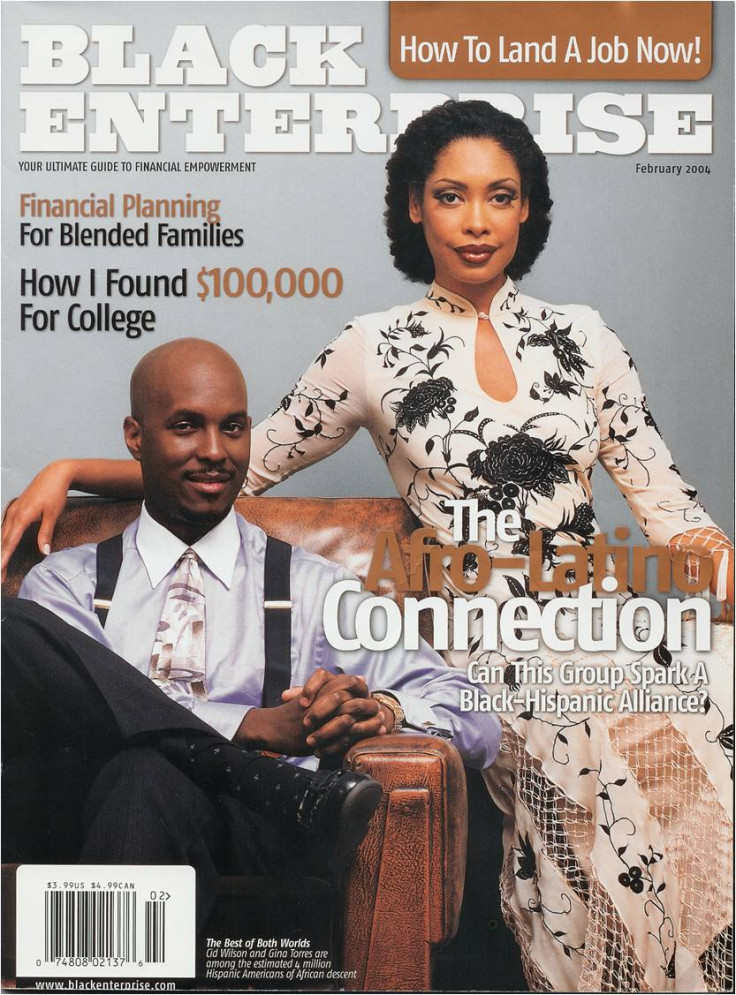This content is part of The Latin Times' first-ever Special Thematic Week focusing on the rise of Afro Latinos, an identity that represents 10% of all Hispanics and Latinos who live in the U.S., according to figures from Pew Research Center. Discover more articles and interviews we've prepared that explore Afrolatinidad, an idea that sits on the frontier of two minorities (Latinos and African Americans) with all the richness, possibilities and challenges that entails.

For decades now, corporate America has struggled with integrating diverse voices into its leadership positions. In 2022, Hispanics made up about 7% of corporate board representation, while Latinas only held 2%. Though issues of representation are ever present today, one organization is arduously trying to change these realities— the Hispanic Association on Corporate Responsibility (HACR). And its CEO, Cid Wilson, is striving to keep incorporating intersectionality into these conversations.
With a Dominican family and growing up in Washington Heights in New York City, Wilson directs programs and initiatives aimed at encouraging Fortune 500 companies to increase Hispanic inclusion in the areas of employment, procurement, philanthropy and governance. Throughout his career, he has become a prominent voice in the Latino community, becoming the first Afro Latino to be featured in the cover of a major news outlet for Black Enterprise Magazine, as well as being interviewed time and time again in major news networks like CNN, ABC News and The Wall Street Journal.
This Afro Latino Week, Wilson and his company seek to elevate and illuminate the voices of Afro Latinos, not only in the U.S., but also across Latin America.
The following interview has been edited for length and clarity.

What is your relationship with the term Afro Latino?
"Afro Latino" is not only a term that I use, but also that I embrace. It's a term that truly captures my identity. We know that there are millions of Latinos that are of African descent throughout Latin America, in fact, there are more Blacks in Latin America than there are in the States. The reason why it is so important to not only illuminate, but also recognize the importance of Afro Latinos is because of the history that Afro Latinos have been left out. The assumption is that you either need to embrace your Black side or you need to embrace your Spanish side.
I am a U.S. born Dominican American, I was born in Washington Heights, in New York City, I lived in New Jersey most of my life. Dominicans are approximately the fourth largest Latino population in the whole country. What I think it's very interesting about Dominicans, is the fact that almost 80% of the population has African ancestry.
I have been using the term Afro latino for over 25 years. It is very common to identify ourselves with our ethnicity. Ever since childbirth I have always said "hey I'm Dominican" and that's just who I am, same thing for those that are Puerto Rican, Cuban-American, Venezuelan, Colombian etc. But I think the use of the word "Afro Latino" really brings together the challenges that all of us who come from Latin America have faced in all of our communities.
What are the challenges of being Afro Latino in the U.S.?
Afro Latinos are often misunderstood by both the Black and Latino communities and overall. Part of that is because our education system didn't teach the full story of how we came into the new world. We learn that slavery was very prevalent in the U.S. but the assumption is that every slave that came from Africa went to the United States. The reality that was not taught is that 94% of all Blacks that were enslaved from Africa who were brought to the New World were brought to Latin America. Only 6% made it to the 13 colonies.
When you factor and understand that such an overwhelming majority of Blacks were enslaved in Latin America, and understanding what that meant in terms of the institutions, you can see how there was the issues of not being included, often being mistreated, or not being given those opportunities of others who might be more European centric might be able to achieve. So, when Afro Latinos, and Latinos in general, come to the U.S. and watch telenovelas, for example, and you don't see people that look like me and speak Spanish, except for some very stereotypical roles that they may have, it creates certain stereotypes among Latinos toward Afro Latinos. But even within the Black community who have had a deeply unfortunate history of experiencing racism in the United States.
When you look at history, we see that everybody, Blacks, Latinos as well as America in general, needs to know and understand that we experience all the same challenges that Black communities face and that Latinos face. When you see me walking down the street, what you see is a black man. If I were dressed in a hoodie, in sweats, one might make a stereotypical assumption of who I am, without having any idea that that person happens to be the Chief Executive Officer of the largest national hispanic organization focused on advancing hispanic inclusion in the United States.
Do you see these challenges in Corporate America as well?
Absolutely. After the death of George Floyd in 2020, HACR did something no other organization had done before. We did a series called "Afro Latinos in Corporate America". When we did our first one in 2020, it was the no.1 most watched webinar we ever did.
It was because Corporate America began to see how their structure of inclusivity was in some cases, intentionally or unintentionally, leaving out Latinos. That summer, after we did our first webinar, I knew that there were dozens of companies that changed their 2020 Hispanic Heritage Month plan. They were virtual because, remember we were in our pandemic, but companies realized "oh my goodness, we have never included Afro Latinos." So, many changed their agendas so we could have these discussions about afro latinos.
When that happened, the amount of engagement soared because there were so many Latinos that said "finally for the first time someone is seeing me and not just hearing me in terms of my language. They're seeing my blackness, they're seeing that with that blackness there comes experiences that are a direct result of our skin color as black people.''
When that happened, Corporate America began to recognize that if you're going to have a fully inclusive corporate culture for Latinos and Black people, it means that you also have to have that culture that includes Afro Latinos, which includes not making us choose between being Black or being Latino.
How does your organization celebrate Black History Month?
We very much celebrate Black History Month, Martin Luther King Day, Juneteenth and other important milestones within the Black community, and we celebrate whether you are Afro Latino or not. Naturally for me, because it's part of who I am, it is why I make sure that I am fully embracing and inclusive of celebrating those major milestones but also illuminating the continued challenges and struggles that are impacting the black community, but for my organization we also do it because we wanna be strong allies.
The challenges that impact the black community, the latino community, as well as for many of our allies in the LGBT community, the Asian-American community, in the Jewish community and Muslim, and women. Many of our common challenges of not being included, sometimes being mistreated in who we are, we wanna make sure that we are strong allies, of whether it is Black History Month or Pride Month whether it is any other month that we are illuminating, because when the month is over, we're still Black, we're still Latino. That means that we use this to illuminate, to celebrate and to highlight, but it doesn't mean that when the month is over we go back to the status quo. We use it as a momentum builder to build a more perfect union.

Looking ahead, what is your hope for the future in relation to Afro Latinos in the U.S.?
My hope is that we have a future where every Afro Latino, where every person of color, can walk into a room, walk into a business establishment and be recognized for who we are, and not prejudged for something that is stereotypical. And part of that is that we have to embrace our history.
The reality is, especially in this year, and in this moment, others that are trying to change history, to suppress history because of the fact that we don't want to recognize some of the very simple things that not only the U.S. has done to Black people, but also what has been the history of Blacks throughout Latin America.
Once we understand those histories, it helps us understand each other so we can fully embrace and recognize that what happened in the early years can never ever happen again. But it also means that we have to embrace what it means to be Afro Latino, what it means to be Black, what it means to be Latino, and our customs and culture that come with it. We need to embrace a society that supports acculturation, not asking us to assimilate into a society that is viewed from a prism from a white caucasian male, as to what I should be.
© 2024 Latin Times. All rights reserved. Do not reproduce without permission.







